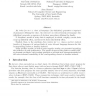Free Online Productivity Tools
i2Speak
i2Symbol
i2OCR
iTex2Img
iWeb2Print
iWeb2Shot
i2Type
iPdf2Split
iPdf2Merge
i2Bopomofo
i2Arabic
i2Style
i2Image
i2PDF
iLatex2Rtf
Sci2ools
ALT
1997
Springer
1997
Springer
Synthesizing Noise-Tolerant Language Learners
An index for an r.e. class of languages (by definition) generates a sequence of grammars defining the class. An index for an indexed family of languages (by definition) generates a sequence of decision procedures defining the family. F. Stephan’s model of noisy data is employed, in which, roughly, correct data crops up infinitely often, and incorrect data only finitely often. Studied, then, is the synthesis from indices for r.e. classes and for indexed families of languages of various kinds of noise-tolerant language-learners for the corresponding classes or families indexed. Many positive results, as well as some negative results, are presented regarding the existence of such synthesizers. The proofs of most of the positive results yield, as pleasant corollaries, strict subset-principle or tell-tale style characterizations for the noise-tolerant learnability of the corresponding classes or families indexed.
ALT 1997 | Corresponding Classes | Indexed Family | Machine Learning | Tell-tale Style Characterizations |
| Added | 07 Aug 2010 |
| Updated | 07 Aug 2010 |
| Type | Conference |
| Year | 1997 |
| Where | ALT |
| Authors | John Case, Sanjay Jain, Arun Sharma |
Comments (0)

